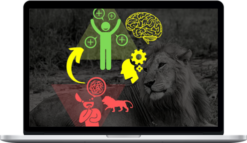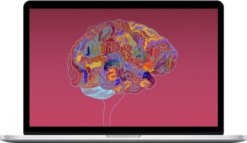Sensebridge School – When Nothing Helps: Scientifically-Based Psychology Foundations Course
$25.00 $13.00
»Delivery: Within 21 days
Description
Sensebridge School – When Nothing Helps: Scientifically-Based Psychology Foundations Course
Description Of When Nothing Helps: Scientifically-Based Psychology Foundations Course
This course offers a distinctive and effective solution to the vast and often perplexing array of information in the field of psychology. By concentrating on the role of temperament, an almost unalterable aspect that shapes our personality, values, and objectives, we assist individuals in prioritizing their learning and comprehending the essential aspects of the subject.
Through this course, participants will acquire valuable insights and tools to engage with their own beliefs and tendencies, ultimately fostering greater self-awareness.
The Sensebridge School’s primary focus is on temperament, which enables a better understanding of ourselves and others, leading to more effective self-improvement and psychological assistance. Our understanding of inherent individual differences is rooted in neurobiological variances. Temperamental traits are intricately linked to how our brain processes information and possess a strong evolutionary rationale.
A Comprehensive Examination of the Psyche
Designed for individuals seeking an in-depth understanding of their psyche, this course navigates the myriad schools, approaches, and practices within psychology.
Our unique emphasis on understanding one’s temperament not only addresses individual differences but also facilitates a personalized comprehension of mental health and well-being.
What You’ll Learn In When Nothing Helps: Scientifically-Based Psychology Foundations Course
Key Concepts Explored in the Course:
- Goal Setting: Examine the process of formulating individualized, specific objectives that correspond with personal values.
- Temperament: Investigate the influence of distinct temperaments on beliefs, behaviors, and reactions.
- Values: Analyze the significance of values and their impact on identity and aspirations.
- Self-Awareness: Cultivate a profound comprehension of oneself and one’s mental processes.
- Cognitive Biases: Discover the correlation between temperament traits and cognitive biases.
- Internal Conflicts: Address the discord that arises from unique temperaments and develop strategies to harmonize with one’s traits.
- Meaning of Life: Explore broader themes, including coping mechanisms, uncertainty, and the repercussions of our actions.
Course Structure:
This course is comprised of seven lessons, each containing video and audio content with a total runtime of approximately 75 minutes. A comprehensive PDF guide accompanies each lesson. Furthermore, a workbook with assessment tasks is provided to facilitate personal exploration and practice, aiding in self-improvement.
- Lesson 1: Delve into the complexities of studying the human mind, drawing from both Western and Eastern traditions. This lesson discusses various theories and perspectives in psychology and psychiatry, emphasizing the importance of individual differences and their impact on well-being.
- Lesson 2: Examine the intricacies of goal setting and its connection to personal values. This lesson explores theories related to goals and the factors shaping our values, emphasizing the significance of individualized and specific objectives.
- Lesson 3: Investigate the role of values in the human psyche and their influence on beliefs, behaviors, and identity. This lesson discusses the importance of respecting and valuing diverse perspectives and the manner in which beliefs and values shape our goals and aspirations.
- Lesson 4: Explore how temperament shapes reactions to the beliefs of others, emphasizing the significance of accepting one’s temperament and aligning goals and values accordingly. This lesson highlights the advantages of temperament and appreciation for the diversity of human experiences.
- Lesson 5: Focus on understanding internal conflicts that arise from unique temperaments and their effect on decision-making and behavior. This lesson emphasizes the importance of comprehending one’s own temperament and finding ways to achieve goals that align with individual traits and tendencies.
- Lesson 6: Examine the relationship between temperament and the ability to achieve goals. This lesson discusses the influence of temperament on decision-making and behavior, as well as the internal inconsistencies caused by conflicting signals from one’s temperament. It also delves into the concept of cognitive biases and their connection to certain temperament traits.
- Lesson 7: In the final lesson, we cover various themes related to the meaning of life, goal setting, uncertainty, consequences of actions, loss of motivation, and mental health. This lesson emphasizes the benefits of exploring broader goals and coping strategies to help individuals navigate the loss of meaning in life. It also examines the challenges of uncertainty and the impact of our actions on ourselves and those around us.
Throughout this course, we emphasize the importance of individual differences and avoid making speculative claims. By focusing on established scientific facts and neurobiological variances, we aim to assist individuals in discovering methods and approaches best suited to their temperament.
Our differences are what make the world so diverse and fascinating, providing us with unique perspectives and opportunities to view familiar things in a new light. In fact, numerous discoveries and breakthroughs have occurred because talented individuals approached problems in unconventional ways that piqued their interest.
Sensebridge School: Our mission is to provide a solid foundation and reliable structure for individuals seeking personal growth, self-exploration, and mindfulness in today’s rapidly changing world.
More courses from the same author: Sensebridge School
Delivery Policy
When will I receive my course?
You will receive a link to download your course immediately or within 1 to 21 days. It depends on the product you buy, so please read the short description of the product carefully before making a purchase.
How is my course delivered?
We share courses through Google Drive, so once your order is complete, you'll receive an invitation to view the course in your email.
To avoid any delay in delivery, please provide a Google mail and enter your email address correctly in the Checkout Page.
In case you submit a wrong email address, please contact us to resend the course to the correct email.
How do I check status of my order?
Please log in to HealingCourse account then go to Order Page. You will find all your orders includes number, date, status and total price.
If the status is Processing: Your course is being uploaded. Please be patient and wait for us to complete your order. If your order has multiple courses and one of them has not been updated with the download link, the status of the order is also Processing.
If the status is Completed: Your course is ready for immediate download. Click "VIEW" to view details and download the course.
Where can I find my course?
Once your order is complete, a link to download the course will automatically be sent to your email.
You can also get the download link by logging into your HealingCourse account then going to Downloads Page.
Related products
Total sold: 6
Total sold: 2
Total sold: 2









